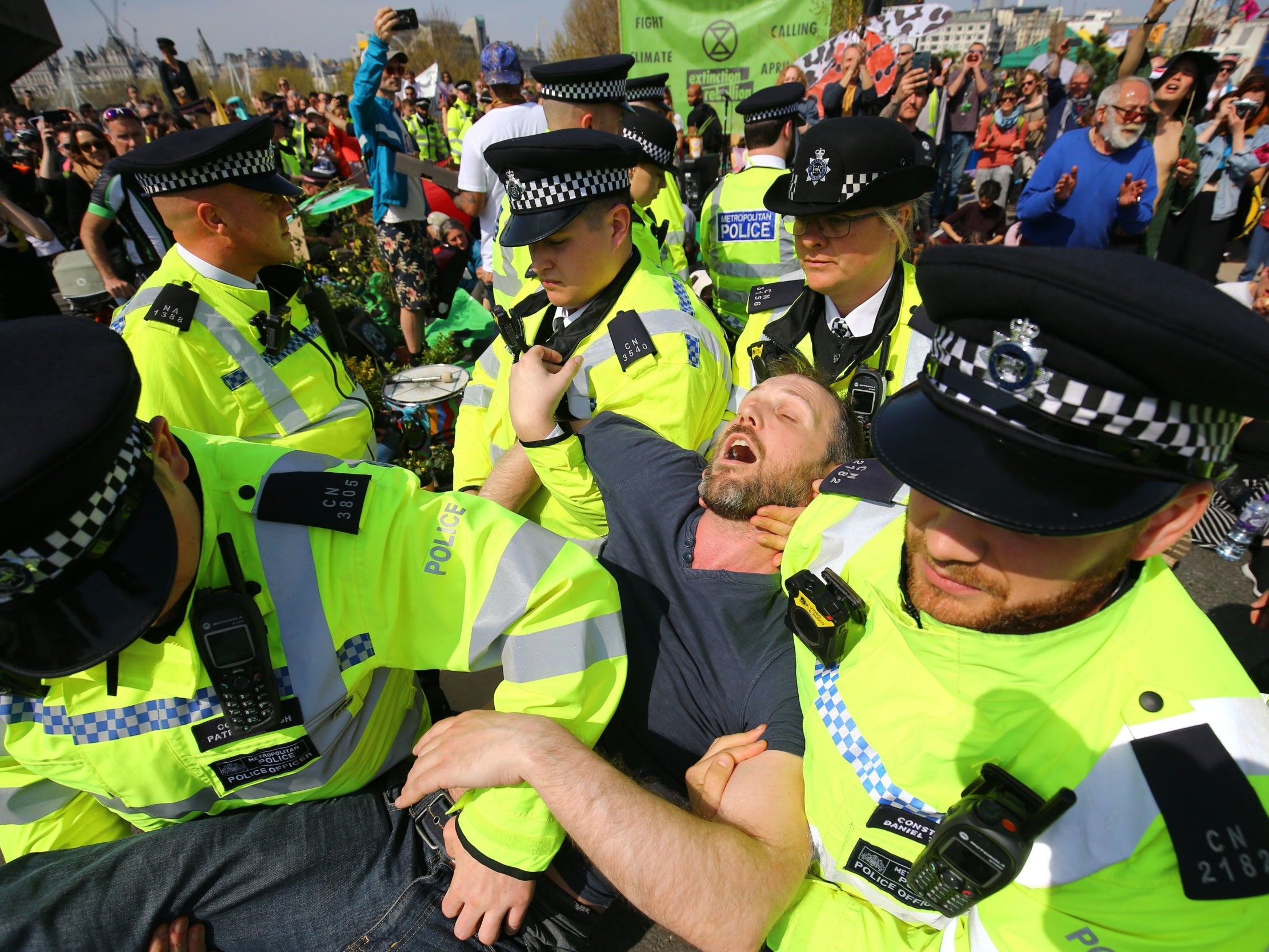Extinction Rebellion: Police to pass 'every single one' of 1,100 arrested protesters to prosecutors
Police in discussions with Home Office over changing public order laws and tougher punishments
Police aim to pass “every single one” of the 1,100 Extinction Rebellion protesters to prosecutors for potential criminal charges, a senior officer has said.
Scotland Yard is in discussions with the Home Office about potential legal changes to increase powers over protests and introduce tougher punishments for offences.
Metropolitan Police deputy assistant commissioner Laurence Taylor said that 70 Extinction Rebellion protesters had already been charged, including activists who climbed on a train.
“We arrested over 1,100 people over Extinction Rebellion,” he told journalists at Scotland Yard.
“We currently have a dedicated team who are looking at every single one of those arrested with a view to present them to the Crown Prosecution Service.”
He spoke as thousands of students joined fresh protests in London and across the UK, calling on the government to take action on climate change.
Friday’s action was part of a global “school strike for climate”, seeing children march from parliament to the Department for Education with signs reading: “If you won’t act like adults, we will.”
Mr Taylor said protesting was not illegal but where individuals’ activity breaks specific laws, police will “take action and look to pursue outcomes through the criminal justice system”.
The bulk of Extinction Rebellion protesters detained were arrested on suspicion of violating conditions aiming to control demonstrations, which blocked Oxford Circus, Waterloo Bridge and Parliament Square during a week of activism in April.
Officers were accused of brutality towards activists after footage emerged of protesters being dragged along the ground by their wrists.
Mr Taylor, who is in charge of maintaining public order in London, said Extinction Rebellion had used “new tactics” by locking down a pink boat and attaching themselves to objects and each other.
He said the use of force was a “last resort” to clear roads, adding: “It was not simple to remove them.”

With more unrest over Brexit and Donald Trump’s state visit approaching, police are concerned that other groups may use Extinction Rebellion’s tactics to cause disruption.
“That is why we’ve asked for a review of legislation, the outcomes and the consequence of that type of activity,” Mr Taylor said.
“We’re doing a review of what we put in place to try and ensure that kind of incident doesn’t happen again.”
Following calls from other senior officers to change “outdated” protest laws, he said police were “engaged with the Home Office” over a potential review of public order legislation.
Speaking to the London Assembly earlier this month, commissioner Cressida Dick said officers would be “more assertive” at any future Extinction Rebellion protests.
Mr Taylor said the Public Order Act currently only allows police to impose conditions where they expect “serious disorder, serious disruption or serious violence”.
He explained: “Quite often you will see protests that are no doubt causing disruption but do not meet the condition of ‘serious’ and therefore we don’t have legislation available to us to put those conditions on.
“The element of seriousness can be quite subjective. It would be useful for us to have a little more objectivity within that definition.”
Mr Taylor argued that the current punishments under the Public Order Act 1986, which allows prison sentences of up to three months, are not a “deterrent”.
“The commissioner and ourselves are keen that when activity goes beyond the law or is entirely unreasonable, there should be consequences,” he added.
“We would like to see greater sanctions for that kind of behaviour.”
Clare Farrell, a co-founder of Extinction Rebellion, said the public should be “grateful to those who put themselves on the line” over what the group says is a climate emergency.
“The police are obviously trying to make an example of us,” she told The Independent. “Whether that will be something that’s successful is in the hands of the criminal justice system. The public might think that it’s not worth the money.”
Ms Farrell acknowledged that public opinion was divided over Extinction Rebellion’s tactics but “most people would be against putting peaceful people in jail”.
She added: “The justice system and the police are supposed to be there to protect people, and that’s what we’re asking the government to do.”
Mr Taylor said that protest was “not an absolute right” and that police would continue to protect infrastructure and sites of national importance in London.
“We need to make sure protests are done in a reasonable and proportionate way,” he added. “We have to balance the rights of everybody, including businesses, politicians and people in London going about their daily business.”

